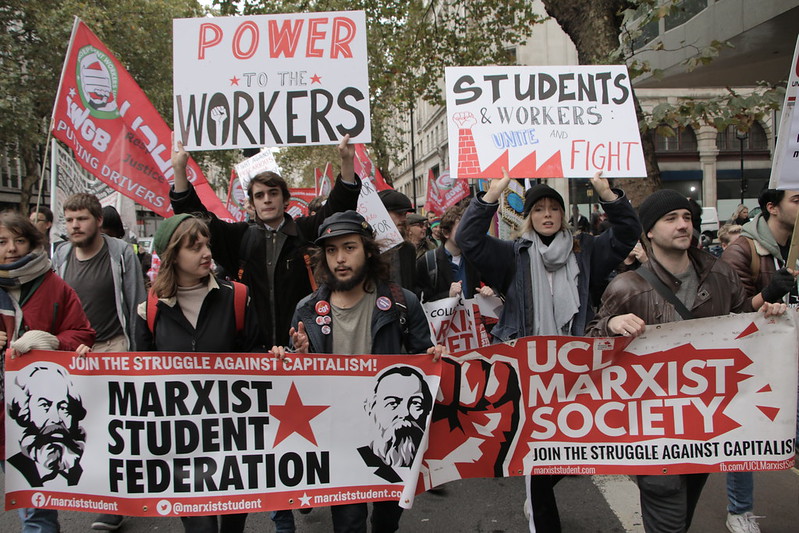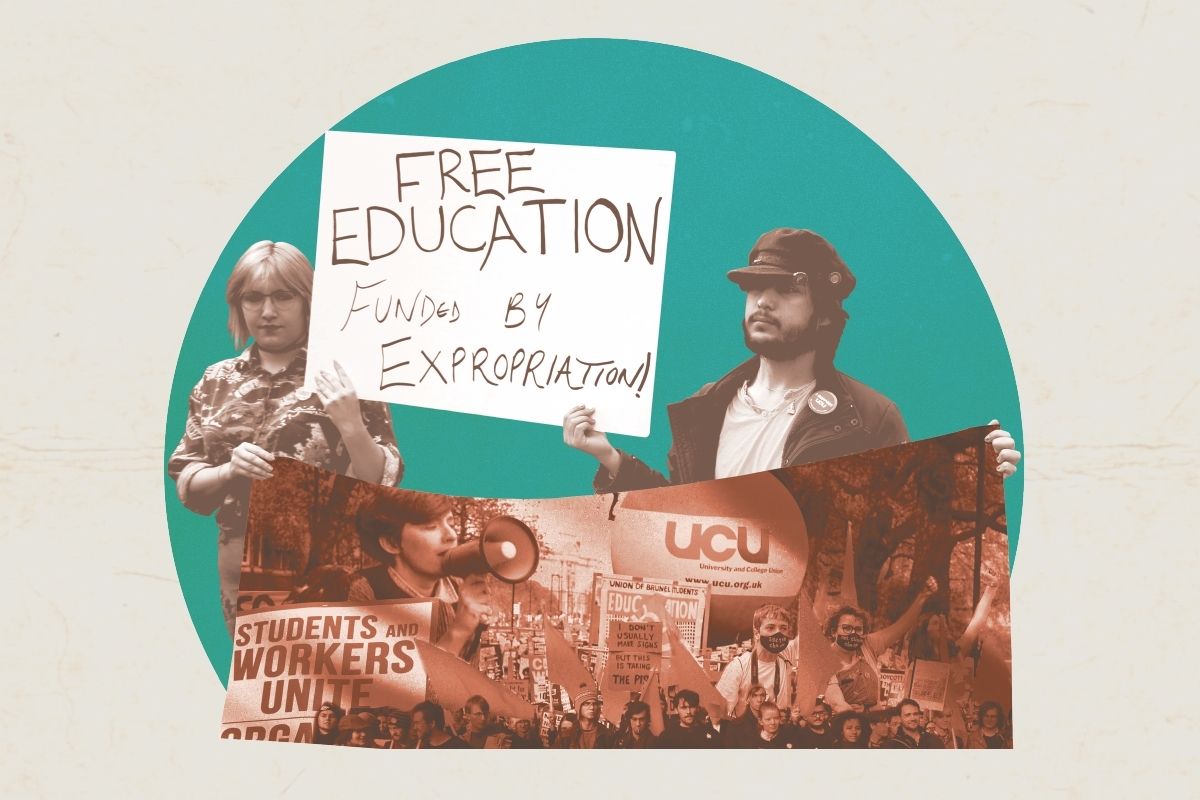As inflation rises, the failures of the marketised model of higher education (HE) are once again in the spotlight. Already, Russell Group universities have claimed that they are making a loss of £1,750 per year on teaching domestic students, with projections that this figure will climb to £4,000 by 2024.
Acknowledging HE’s funding crisis, what are the learned ladies and gentlemen of university management suggesting? Is it to point out that the education of future generations should not be sacrificed on the altar of marketisation? Or to highlight that the money exists to provide free, lifelong education for all?
Nothing of the sort. Instead, in the wake of the recent A-level results day, university bosses are now pressing for tuition fees to be raised closer to £24,000 per year.
The stated aim is to make domestic undergraduates pay the same price as international applicants, who this academic year will make up a record one-in-five of the freshers cohort.
University managements go to great pains to advertise their spaces as ‘open’ and ‘inclusive’. In reality, however, these facilities are increasingly only accessible to the highest bidder.
Cash cows

It has become commonplace in many HE institutions to see a reduction in the admission of domestic students, in order to provide more places for higher-fee-paying overseas students – that is, to squeeze more money out of international students, in order to ‘ease’ universities’ financial woes.
There is an obvious explanation: there is no cap on the amount of fees that universities can charge overseas students. As already highlighted, on average, international students are extorted to the tune of £24,000 a year – almost three times as much as domestic students currently fork out (for now).
Unsurprisingly, Oxford and Cambridge top the charts for filling their courses with candidates from abroad.
Some establishment figures have attempted to pit domestic and international students against one another, cynically implying that British students are being excluded from higher education by a hoard of wealthy (Chinese) foreigners.
In truth, however, university bosses are using overseas students as cash cows, in order to plug the gaping hole in education budgets caused by the crisis of capitalism – a situation that is leading to a race to the bottom for all students and staff, with worsening conditions on campuses across the country.
We must firmly oppose this attempted divide-and-rule strategy of the Tories and the bosses.
It is not a question of ‘British students vs foreign students’, or of ‘students vs staff’. It is the entire model that is broken: where students are positioned as consumers; entire departments are axed; staff are disregarded and degraded; and profit reigns supreme.
Sticking plaster
This crisis in higher education is coming to a head. As Mark Corver, the co-founder of a consultancy firm that advises universities on admissions, admitted: “Some universities may more or less pull out” of offering full-time undergraduate degrees to UK students.
We are then told that this problem can be solved with a rise in the tuition fee cap for British students – once again, attempting to make workers and youth pay for the crisis of capitalism.
But neither increasing costs for domestic students, nor extorting more from overseas students, will fix the deep, festering wound left by over a decade of Tory austerity. Such ‘solutions’ are a mere sticking plaster.
The truth is that education at all levels is seeing death by a thousand cuts. And raising tuition fees, or limiting the number of students who can attend university, will only provoke a backlash.
Anger amassing

It is too soon to say exactly when the tuition fee cap of £9,250 will be removed. But all indicators point towards saddling students with further debt. The bosses are much happier to lay the bill for their crisis at the feet of students, rather than taking a hit to their grand salaries.
When the ‘practical’ decision to triple fees for students was made by the Tory-Liberal coalition government twelve years ago, this was alongside a slashing of university budgets by 40%. Limiting opportunity, aspiration, and accessibility to universities has been the precedent set by successive Tory governments over the past decade.
But the Tories and university bosses should be careful what they wish for, and take heed of what happened when fees were tripled back in 2010. A powerful wave of student protests were unleashed, with a national demonstration in London gathering over 50,000.
Ultimately, this massive student movement was sold out by a leadership who were not willing and able to fight the struggle to the end.
The situation facing students and staff has deteriorated dramatically since 2010. Student services have been cut to the bone; the mental health crisis amongst students worsens by the day; classrooms and courses are more crowded; and university staff have been repeatedly forced into struggle against their abhorrent working conditions.
Alongside these cuts and attacks, UK campuses have also seen rent strikes, fees strikes, protests against racism and sexism, and much more. All of this anger is continuing to amass. And once the floodgates open, we could once again see a flood tide of protest and struggle by university students and workers alike.
Cost of living
This provocation is yet another piece in the bleak picture offered by capitalism. As the cost-of-living catastrophe deepens, conditions for students are becoming ever more intolerable.
Given this dire situation, many young people will already have been demoralised and turned away from pursuing higher education.
The NUS’ recent survey into the cost of living for students revealed that one in three are living on £50 or less per month, after bills and rents are paid. 64% of those surveyed said that their loan or grant did not cover energy bills.
Growing numbers are therefore relying on overdrafts and dodgy loan sharks, or even having to move back in with parents and commute long distances in order to attend lessons.
The fact that university vice-chancellors and management are more concerned about profitability – eagerly committing to ‘hard choices’ that would see fewer prospective students able to access higher education – speaks volumes.
Them and us

We have had enough of the ‘practical’ solutions proposed by university management.
For them, the crisis is one that must be offloaded onto students – already struggling to keep their heads above water – and underpaid-and-overworked university staff.
For us, we understand that the crisis in higher education is a product of the crisis of capitalism. This means that we must fight for a bold socialist alternative.
It is only by getting organised, and linking the fight for free education – under the democratic control of students and staff – to the struggles of the broader working class, that we can hope to tackle the problems afflicting our universities.
This is not the prospect of tomorrow, but a burning question for today. If capitalism cannot afford to provide us with a decent education, then we cannot afford capitalism.
Now more than ever, we need a militant, united movement of workers and students, which aims to fight against marketisation, kick out the Tories, and kick out capitalism.
Now is the time to get organised with the Marxist Student Federation, and prepare for the battles that lie ahead.






